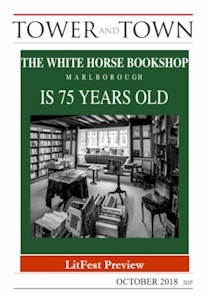

Tower and Town, October 2018 (view the full edition) (view the full edition)Clergy LetterThe Word became Flesh
When Kate Mosse, one of the many authors coming to this year's Literature Festival, featured as the guest for Radio 3's Private Passions, she spoke about her choice of a Bach Brandenberg Concerto. Commenting on the composer as well as the concerto itself, she summed up the strength of her feelings about Bach by saying simply - 'He is the Word'. The Word, or logos in Greek, to which Mosse was referring, is understood as the divine reason implicit in the cosmos, ordering it and giving it form and meaning. For Mosse, there is clearly something about Bach's music that gets to the heart of things and to describe this as the 'Word' seems to me to suggest simultaneously both the power of language and its limitations. For language can point, but not quite connect; there is always something beyond words themselves. The Christian faith is predicated on the belief that the 'Word' became flesh - that is to say, the divine power immanent within the world was embodied in the person of Jesus. It is a staggering claim - that this universe should find its meaning in and through a person who was both fully human and divine. Yet this is basis of the faith and one of the reasons that allows historian Diarmaid MacCulloch to describe Christianity as a 'personality cult'; it follows a person and is not a religion of a book. All of us, whether followers of Jesus Christ or not, need to make sense of life and navigate our way through it. To do this requires being open to learn from others and to having our own world views enlarged. Literature is perhaps the pre-eminent way this happens to us; the creation of characters in fiction allows us to imagine what it is like to be someone else; the well-researched biography shows us how a life was formed and shaped; the well-crafted poem begins to tell us something we secretly know already. I love this quote from William Boyd's 1988 book The New Confessions: I ponder all the possibilities that come with being human. Good and evil, happiness and misery, achievement and failure, love and isolation - everything that goes into being the particular person you are in that particular social and historical setting. That's a lot, isn't it? My God, that's some menu! To explore that menu and to ponder those possibilities is the purpose of both good religion and good literature. |